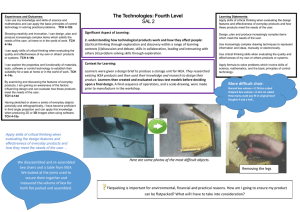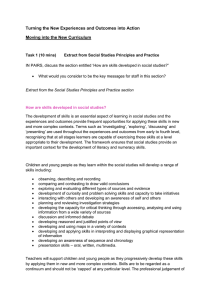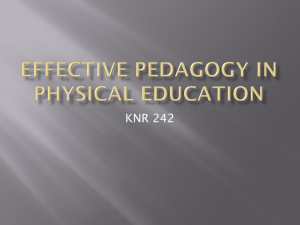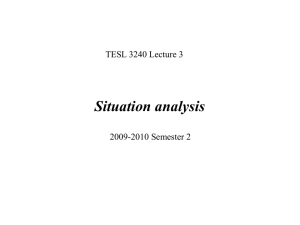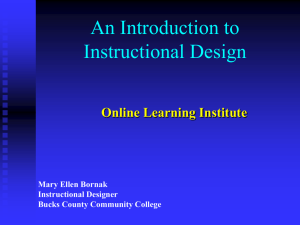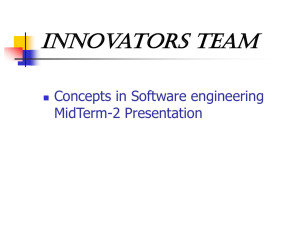TCH 216: Principles and Practices for Teaching and Learning in
advertisement
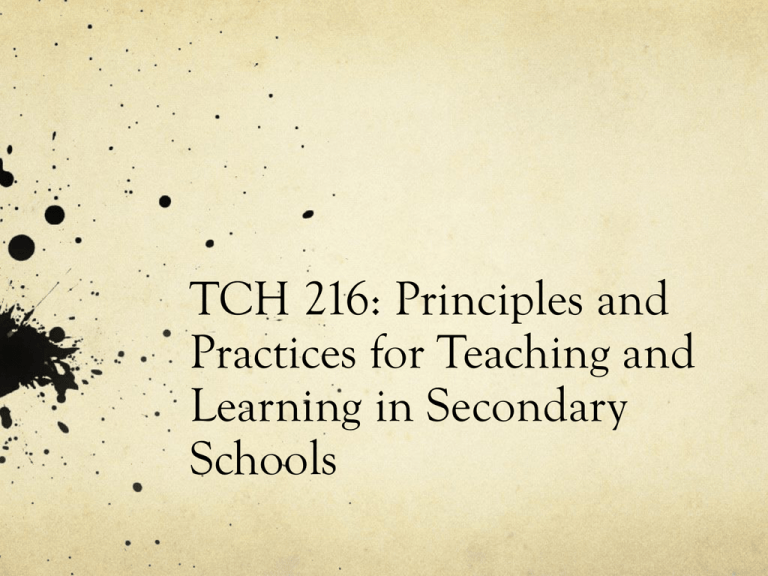
TCH 216: Principles and Practices for Teaching and Learning in Secondary Schools New Course Sequence TCH 212: The Teaching Profession in Secondary Schools TCH 216: Principles and Practices for Teaching and Learning in Secondary Schools TCH 219: Integrating Multiple Literacies and Technology Across the Secondary Curriculum TCH 216: Objectives Identify and respond to the needs of all adolescent learners using the principles of researchbased instruction that are intended to serve diverse populations including, but not limited to, English language learners and exceptional learners. Design instruction using the Illinois Learning Standards, Common Core Standards, educational goals, instructional objectives, learning domains, and appropriate technological resources to teach all learners. Implement research-based models of effective teaching and select appropriate technological resources for the delivery of instruction to all learners. Develop effective assessment instruments and interpret student performance data to inform instruction. Develop effective classroom management methods that include setting high expectations for academics and behavior in order to create and maintain a safe and positive learning environment. Implement reflective teaching processes, knowledge, skills, and dispositions of a professional educator to enhance student learning and teacher decision making that are in congruence with the Illinois Professional Teaching Standards and the Illinois State University conceptual framework Realizing the Democratic Ideal. TCH 216: Content Outline Curriculum and Instruction: Principles and Practices Instructional Unit and Lesson Planning Models Instructional Objectives for Student Learning Illinois Learning / Common Core Standards Instructional Methods and Procedures Illinois Professional Teaching Standards Formative and Summative Evaluation and Assessment: Principles and Practices Effective Formative/Summative Assessment Methods Traditional and Authentic Assessment Methods Reflection of Assessment to Inform Teaching Effective Classroom Contexts: Principles and Practices Classroom Culture and Dispositions Instructional Technology Use and Selection Classroom Communication Classroom Management Grade Management Instructional and Social Needs of Diverse Learners: Principles and Practices Models of Diverse Instruction Cultural and Linguistic Diversity Exceptionalities TCH 216: Assignment Categories Clinical Experiences (25%): Uhigh Experience (i.e. observation journal, teaching journal, summative evaluation) Microteaching (20%): In-class small topic teaching demonstration and reflection Classroom Planning Documents (20%): Lesson plans and classroom management plans and document Final Exam/Project/Portfolio (15%): A final paper, test, or project Professionalism (10%): Attendance, participation, etc… TCH 216: Points (example) TCH 216: General Timeline Week Class Uhigh 1-2 Introduction / Goals and Objectives 3-5 Lesson Planning / Methods Observations 6-8 Assessment / Microteaching Working in CTs room 9-13 Classroom Management / Special Education Teaching Window 14 - 15 Diversity / RTI / ESL Final Conferences 16 Clinical Debriefing / Course wrap up EdTPA EdTPA is a performance-based assessment that occurs during student teaching. Portfolio-based, similar to National Boards. In TCH 216 students will be beginning to use edTPA terminology and answer edTPA-like questions in the “pedagogy assignment”. The summative assessment also uses some edTPA language. Pedagogy Assignment Based on the students’ 3 days of teaching They reflect upon their: Planning Teaching The overall experience It requires the that ISU students get to know the Uhigh students, put thought into the design of their teaching, and reflect upon the success of their lessons. Questions?
